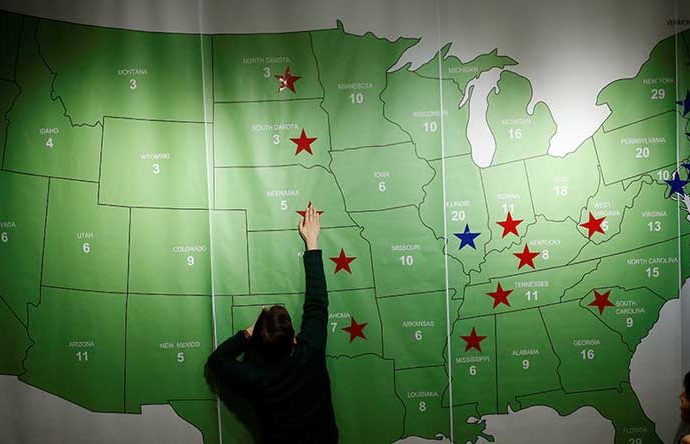Is it time to change America’s archaic Electoral College system?
“The counting of votes that are of questionable legality does, in my view, threaten irreparable harm to petitioner Bush, and to the country, by casting a cloud upon what he claims to be the legitimacy of his election.”
This was the reasoning offered by the late Justice Scalia in denying the Gore campaign’s case for a recount in Florida during the 2000 US presidential election.
The Supreme Court’s ruling meant George W Bush would become president-elect, winning Florida by merely 537 votes. This was the narrative that captivated, and at times infuriated, the nation.
Vastly overlooked, but not completely ignored, was the fact that Al Gore had won the popular vote by more than 500,000 ballots cast. That was the first time since 1888 that a candidate had won the election while losing the popular vote.
Of course, recent developments have ensured that it was not the last time.
Donald Trump shocked the world on November 8 by winning the presidency. However, while the impact of this bombshell confounded pundits and pollsters alike, Hillary Clinton surged ahead in the popular vote and was well ahead of Trump.
This is the result of a voting system that apportions electoral votes in a winner-take-all method in almost every state, barring Maine and Nebraska.
The Electoral College system guarantees that presidential candidates will focus the overwhelming majority of their campaign strategy in a handful of swing states, at the expense of voters in so-called “safe” states which are either guardedly Democratic (California) or Republican (Louisiana).
This disparity discourages voter turnouts in states considered to be leaning heavily for one party or the other.
Not to mention that US territories such as Puerto Rico and the Virgin Islands receive no electoral votes at all.
Additionally, third-party and independent candidates are entirely excluded from the electoral process because of the cut-throat nature of vote allocation. Ross Perot, running as an independent in the 1992 election, won 18.9% of the popular vote but finished without a single electoral vote to his name.
Perhaps the most significant aspect of the system is that it undermines one of the foundations of electoral democracy: One person, one vote.
As Bruce J Schulman, Professor of History at Boston University, notes: “Wyoming has 750,000 people, roughly, and it has three electoral votes, whereas California has 38 million people or so, and it has 55 electoral votes. What that means is there are three times as many electoral votes per person in Wyoming as there are in California.”
To an observer any discussion of the system might seem like a wholly partisan issue due to the fact that only Democrats have been at the receiving end of the disadvantages, at least recently
This is important, not only because of the blatant disproportionality, but also because this is one of the fundamental reasons for the continuation of the Electoral College.
Small states like Wyoming benefit hugely from their increased electoral clout in proportion to their populations, and are unlikely to back any constitutional amendment to overturn the system, which requires three-quarters of the states to ratify.
Several amendments have been proposed to abolish the Electoral College, including the Bayh-Celler Constitutional amendment and the Every Vote Counts Amendment.
However, currently, the best chance of any change lies with the proposed National Popular Vote Compact.
The compact does not amend the constitution. Rather, it requires that states that sign agree to pledge their electors to the winner of the popular vote, regardless of who wins the Electoral College.
Currently, all the states that ratified the agreement are all strongly Democratic, and consist of 165 electoral votes. For the agreement to come into effect, the majority of 270 electors have to sign on.
To an observer, any discussion of the system might seem like a wholly partisan issue due to the fact that only Democrats have been at the receiving end of the disadvantages, at least recently.
Ironically, though, the bipartisan nature of the problem was accentuated when current president-elect Trump tweeted the following when, in 2012, it initially seemed like Mitt Romney had lost the election, while winning the popular vote: “The electoral college is a disaster for a democracy.”
Recent election results have revealed a heavily polarised electorate, with only a few states deciding the entire contest and so, unless a bipartisan and unified effort is made on behalf of amending the system, one side or the other is going to continue to feel the brunt of inequitable electoral practices.
Source: Dhaka Tribune










